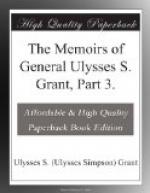At once the freedmen became self-sustaining. The money was not paid to them directly, but was expended judiciously and for their benefit. They gave me no trouble afterwards.
Later the freedmen were engaged in cutting wood along the Mississippi River to supply the large number of steamers on that stream. A good price was paid for chopping wood used for the supply of government steamers (steamers chartered and which the government had to supply with fuel). Those supplying their own fuel paid a much higher price. In this way a fund was created not only sufficient to feed and clothe all, old and young, male and female, but to build them comfortable cabins, hospitals for the sick, and to supply them with many comforts they had never known before.
At this stage of the campaign against Vicksburg I was very much disturbed by newspaper rumors that General McClernand was to have a separate and independent command within mine, to operate against Vicksburg by way of the Mississippi River. Two commanders on the same field are always one too many, and in this case I did not think the general selected had either the experience or the qualifications to fit him for so important a position. I feared for the safety of the troops intrusted to him, especially as he was to raise new levies, raw troops, to execute so important a trust. But on the 12th I received a dispatch from General Halleck saying that I had command of all the troops sent to my department and authorizing me to fight the enemy where I pleased. The next day my cavalry was in Holly Springs, and the enemy fell back south of the Tallahatchie.
Holly Springs I selected for my depot of supplies and munitions of war, all of which at that time came by rail from Columbus, Kentucky, except the few stores collected about La Grange and Grand Junction. This was a long line (increasing in length as we moved south) to maintain in an enemy’s country. On the 15th of November, while I was still at Holly Springs, I sent word to Sherman to meet me at Columbus. We were but forty-seven miles apart, yet the most expeditious way for us to meet was for me to take the rail to Columbus and Sherman a steamer for the same place. At that meeting, besides talking over my general plans I gave him his orders to join me with two divisions and to march them down the Mississippi Central railroad if he could. Sherman, who was always prompt, was up by the 29th to Cottage Hill, ten miles north of Oxford. He brought three divisions with him, leaving a garrison of only four regiments of infantry, a couple of pieces of artillery and a small detachment of cavalry. Further reinforcements he knew were on their way from the north to Memphis. About this time General Halleck ordered troops from Helena, Arkansas (territory west of the Mississippi was not under my command then) to cut the road in Pemberton’s rear. The expedition was under Generals Hovey and C. C. Washburn and was successful so far as reaching the railroad was concerned, but the damage done was very slight and was soon repaired.




